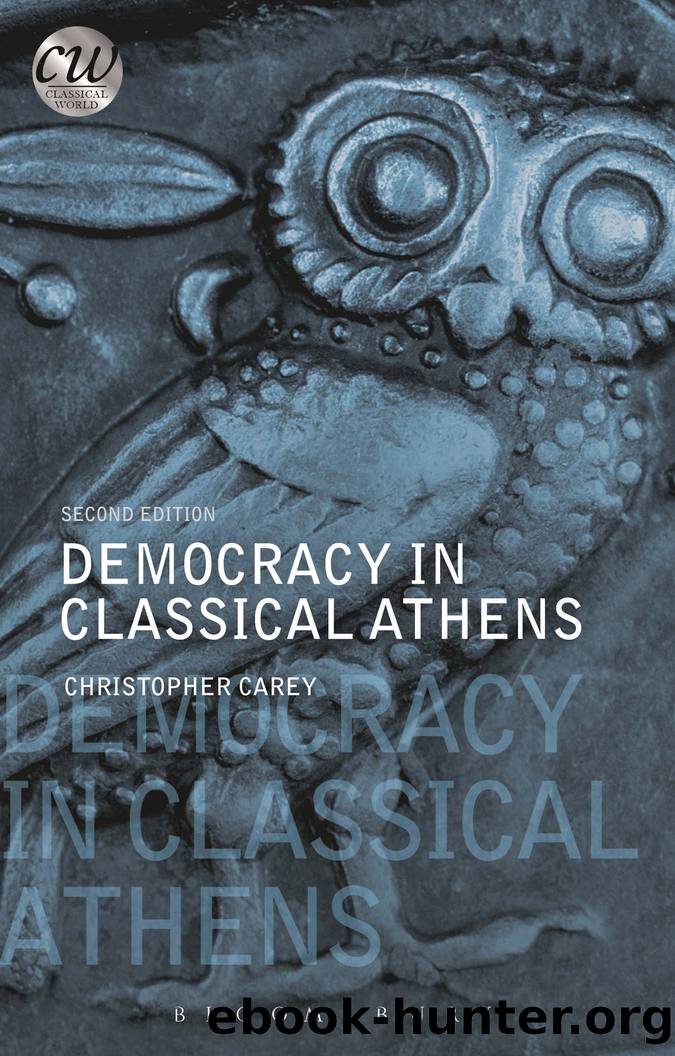Democracy in Classical Athens by Christopher Carey;

Author:Christopher Carey; [Carey, Christopher]
Language: eng
Format: epub
ISBN: 9781474286374
Publisher: Bloomsbury UK (Minor Textbooks)
Published: 2016-11-15T00:00:00+00:00
5.3 Elected officials
Although the lot was crucial to democratic ideology, the Athenians themselves were aware that it had its limitations. Lot can be used for duties which require qualities which are reasonably common (such as common sense, judgment, integrity, efficiency). It is less useful for jobs requiring specific skills and experience. And the more important the decisions taken, the more risky the reliance on lot. Posts requiring a high degree of expertise were filled by election by show of hands (cheirotonia) in the Assembly. Likewise, because of the need for continuity the usual restrictions on reselection did not apply in the case of these posts. Here we are moving into the world of (what we would call) the professional.
The posts emphasized in Athenian Constitution as belonging to this category are the most obvious ones, the military offices.18 This applied to all of them. At the top were the ten generals (strategoi). In the fifth century they functioned as a board but during the fourth century they were each given specific responsibilities. Each tribal infantry contingent was commanded by a taxiarch (taxiarchos) and each tribal cavalry contingent by a phylarch (phylarchos, âtribal commanderâ). In addition, there were two hipparchs (hipparchoi, âcommanders of horseâ) with overall command of the cavalry, subordinate to the generals.
Given the crucial importance of the water supply in the dry climate of Greece, it is not surprising that the epimeletes ton krenon, âsupervisor of the springsâ, was elected.19
The other major area where election plays a significant role is finance. Though routine financial management was left to the relevant boards under the supervision of the Council, there were some posts where the scale of the income or expenditure or the importance of the policy decisions involved placed them beyond routine competence. In the fifth century the officials responsible for the accounts of the Athenian empire, the Hellenotamiai (âtreasurers of the Greeksâ), were probably elected (a possible but not inevitable inference from the presence of politically prominent figures among their number). During the fourth century we find individual financial officials and boards in operation in areas where traditionally the Council would have had oversight. The treasurer of the military fund, tamias ton stratiotikon, was elected.20 During the period of military expansion following the creation of the Second Athenian League in 378, this fund received the unspent residue which the administrative boards received under the merismos. In the 350s, with the emergence of a more cautious foreign policy in the wake of the Social War, which cost Athens the more important members of the League, the annual budgetary surpluses were transferred into the theoric fund, and the fund was used not only to provide for citizen attendance at festivals but also for major public works, both defensive and civil.21 The officials in charge (hoi epi to theorikon) were elected.22 The importance of this board can be seen from the fact that leading political figures were eager to serve on it: Euboulos in the 350s, Demosthenes and Demades in the 330s. By
Download
This site does not store any files on its server. We only index and link to content provided by other sites. Please contact the content providers to delete copyright contents if any and email us, we'll remove relevant links or contents immediately.
| Anarchism | Communism & Socialism |
| Conservatism & Liberalism | Democracy |
| Fascism | Libertarianism |
| Nationalism | Radicalism |
| Utopian |
The Secret History by Donna Tartt(16723)
The Social Justice Warrior Handbook by Lisa De Pasquale(11506)
Thirteen Reasons Why by Jay Asher(7833)
This Is How You Lose Her by Junot Diaz(5829)
Weapons of Math Destruction by Cathy O'Neil(5080)
Zero to One by Peter Thiel(4867)
The Myth of the Strong Leader by Archie Brown(4809)
Promise Me, Dad by Joe Biden(4478)
Beartown by Fredrik Backman(4465)
How Democracies Die by Steven Levitsky & Daniel Ziblatt(4448)
Stone's Rules by Roger Stone(4438)
The Fire Next Time by James Baldwin(4373)
100 Deadly Skills by Clint Emerson(4108)
A Higher Loyalty: Truth, Lies, and Leadership by James Comey(4059)
Rise and Kill First by Ronen Bergman(4045)
The David Icke Guide to the Global Conspiracy (and how to end it) by David Icke(3913)
The Farm by Tom Rob Smith(3895)
Secrecy World by Jake Bernstein(3808)
The Doomsday Machine by Daniel Ellsberg(3758)
